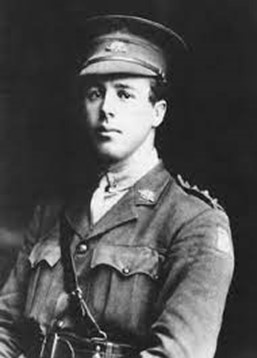 Sir Gilbert Dyett CMG was born in Bendigo in 1891. He was an Australian soldier, veterans' rights activist and National President of the Returned Sailors, Soldiers and Airman's Imperial League of Australia (now the RSL) from 1919 to 1946.
Sir Gilbert Dyett CMG was born in Bendigo in 1891. He was an Australian soldier, veterans' rights activist and National President of the Returned Sailors, Soldiers and Airman's Imperial League of Australia (now the RSL) from 1919 to 1946.
A First World War veteran of the Gallipoli Campaign, where he was severely wounded at Lone Pine, Dyett also served as Dominion President of the British Empire Services League from 1921 to 1946.
Dyett was Secretary of the Victorian Trotting and Racing Association for 30 years from 1919 to 1949, until proprietary racecourses including Williamstown and Ascot were closed and night trotting commenced at the Royal Melbourne Showgrounds.
Dyett managed the consolidation of scattered trotting dates to enable regular weekly racing for a season at the Bridge Road Richmond track owned by John Wren and promoted the Richmond Thousand, the “Melbourne Cup of Trotting”.
He was one of the four members of the organising committee for the first Inter Dominion and organised the horse transportation that enabled New Zealand and east-coast horses and connections to compete in Perth in 1936.
He instituted reforms in registration and horse descriptions of standardbred horses to stop “ring-ins” and established and conducted the Australian Central Registry of Names for many years. The system for naming that he established formed the basis of that used by HRA today.
He was the starter and, at times, time-keeper, steward and judge at Wren’s Richmond, Ascot and Fitzroy tracks.
He was on the Racecourse Licences Board of Victoria from 1930 to 1951.
His organisational skills were legendary.
In addition to his work in harness racing, he:
- Headed the Australian delegation to 1937 Coronation in London.
- Was the Australian representative at three International Conferences of Returned Service Organisations.
- Was a Board Member of Australian War Memorial in Canberra.
- Was Secretary of the Great Ocean Road Memorial Committee.
He was appointed a Companion of the Order of St Michael and St George in 1927 and was made Knight Bachelor in 1934.
Dyett died in Melbourne in 1964, aged 73, following a long illness.
Read more: Sir Gilbert Joseph Cullen DYETT
WATCH: Ian Dyett accepts the nomination.
Footnote:
The Victoria Racing Club's temporary refusal to accept Wren's nominations was based on competition for gamblers' shillings and distaste for his origin, associations and success.
Wren's response was to buy into Richmond, Fitzroy and Ascot pony courses, which he personally controlled and cleansed. His use of professional stewards was an innovation.
There is no evidence that he had associations with the murderous tout 'Squizzy' Taylor.
In 1910 Wren established the Victorian Trotting Association to reform a stagnant and corrupt sport, long before other states did the same.
A typically audacious coup was to stage an 'Ascot Thousand' to replace the postponed Melbourne Cup in 1916.
To stall the campaign against proprietary racing, he sold his Victorian interests in 1920 to the Victorian Racing and Trotting Association with (Sir) Gilbert Dyett as secretary, but a select committee suggested that this action was a subterfuge.
To Wren's chagrin, Premier John Cain in 1947 established an independent Trotting Control Board.
In Brisbane-Ipswich Wren owned six racecourses, including Doomben. A Queensland inquiry under a non-Labor government found in 1930 that, because proprietary racing was controlled by Wren, it was inherently corrupt.
In 1948 Wren told a Commonwealth Royal Commission that he had bought Albion Park for £31,000, sold it for £450,000 and earned £300,000 from it.
Wren owned the Belmont Park track in Western Australia, but it is unclear how involved he was in Sydney with James Donohoe and Sir James Joynton Smith. After Murmur, Wren's own horses, carrying the Collingwood Football Club's magpie colours, were moderately successful.

